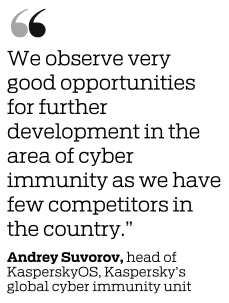
Russian cybersecurity company Kaspersky is deepening collaboration with its Chinese partner Centerm, a smart terminal provider, to further exploit global market potential.
Andrey Suvorov, head of KasperskyOS, Kaspersky's global cyber immunity unit, said China now has a very strong information and technology industry. "The country's hardware is particularly good and we want to leverage the strength for win-win cooperation and join hands with our Chinese partner to tap the immense global cyber immunity market."
Last week, Kaspersky and Centerm co-launched their latest model of thin clients with a cyber immune approach, which Kaspersky said will no longer require additional security software.
Thin client is a compact endpoint that provides users with access to a remote desktop and serves as a substitute for a local workstation.
The latest model of thin clients is designed for protection of organizations with a large branch network and geographically distributed businesses.
"By pooling resources and expertise together, Kaspersky and Centerm aim to capitalize on their respective strengths in operating systems and hardware, with a global distribution strategy in mind," said Suvorov.
He said the partnership is to better tap the fast-growing global thin client market, which industry analysis provider International Data Corp estimated will see a compound annual growth rate of 6 percent from 2021 to 2026.
Verified Market Research, a consultancy headquartered in the United States, said it expects the market's global sales revenue to reach about $1.36 billion in 2028.
Suvorov said he anticipates significant progress in the sector in China this year, building upon the two firms' successful track record in the region. He, however, did not disclose specific numbers.
"We observe very good opportunities for further development in the area of cyber immunity as we have few competitors in the country. In the traditional cybersecurity sector, there are many well-established names in the country. The competition is fierce," he said.
Notably, Kaspersky's approach in China has evolved from selling products to fostering co-development partnerships with local companies. Suvorov emphasized a shared intellectual property model, where Chinese partners can contribute to innovation and share the benefits of collaboration. "They know better about the market and we seek winwin cooperation," Suvorov said.
Beyond product development, there is room for cooperation in areas such as the internet of things and smart city gateways. Discussions are on regarding the establishment of a research and development center in China, demonstrating Kaspersky's commitment to further investment in the region, he said.
Demand for cybersecurity products and services saw rapid growth in China in recent years, alongside its fast-evolving digital industry, said a report by the China Cybersecurity Industry Alliance. It said over 20,000 clients continued their purchase of cybersecurity products and services in the past three years. In all, 67,183 companies made such purchases in 2022.
The Chinese cybersecurity sector grew 3.1 percent year-on-year to 63.3 billion yuan ($8.3 billion) in 2022 and may surpass 80 billion yuan in 2025. Shanghai-listed Qi-Anxin has the largest market share of nearly 10 percent, followed by Venustech with around 7 percent.
In the first half of 2023, 3,984 companies started cybersecurity business, up 22.4 percent year-on-year, the report said.
Experts said the development of the digital economy has provided new impetus for the development of the cybersecurity sector, while the top-level design of cybersecurity-related policies has gradually improved, offering the sector strong support.
Yin Hao, an academician with the Chinese Academy of Sciences, said at a recent forum that after the deep integration of 5G networks with various industries, there has been a boom in new businesses, new technologies and new scenarios. This, however, brings new cybersecurity challenges and opportunities as well.
He said there is a need to enhance the security for key technologies involved in 5G-industry integration, identify cybersecurity needs that vary in different industries, and formulate customized cybersecurity services and products.
liuyukun@chinadaily.com.cn

